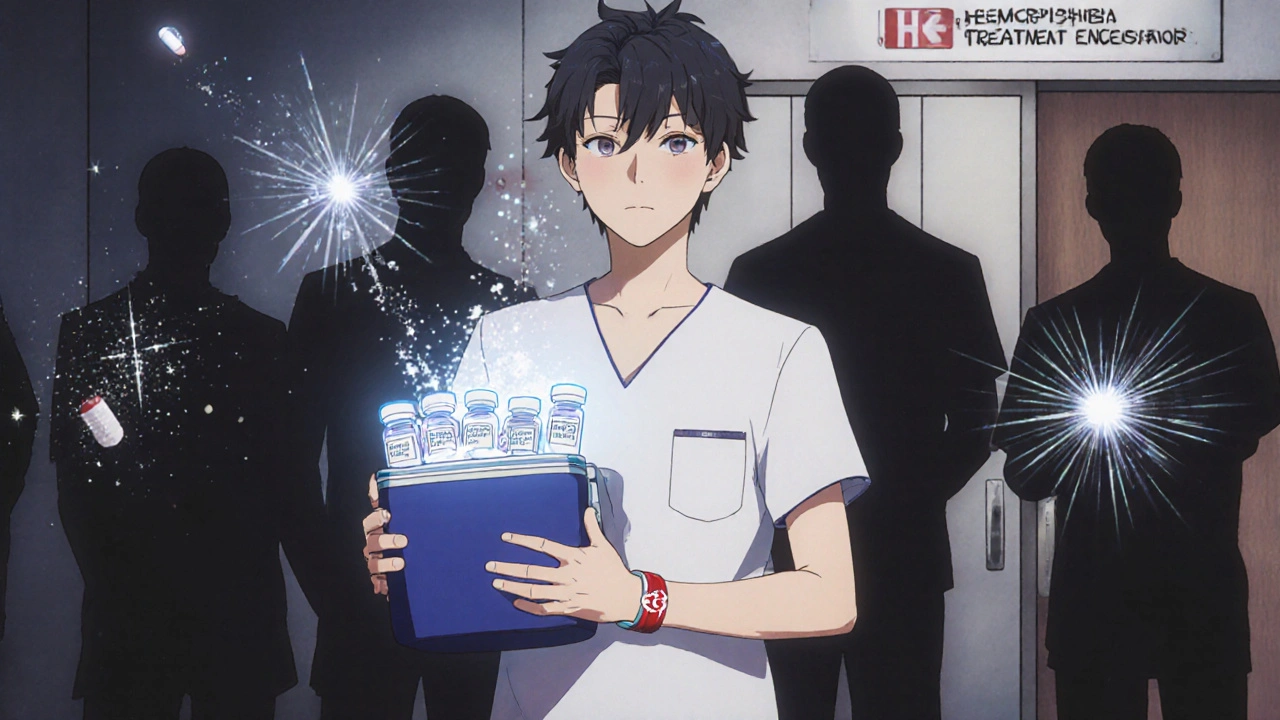If you have hemophilia and need surgery, the biggest fear isn’t the operation itself-it’s the bleeding. Even a simple tooth extraction can turn dangerous without proper planning. But here’s the truth: with the right preparation, people with hemophilia can have surgeries safely, just like anyone else. The key isn’t avoiding surgery-it’s controlling the bleeding before, during, and after.
Understanding Hemophilia and Surgical Risk
Hemophilia is a genetic disorder where the blood doesn’t clot properly because of missing or low levels of clotting factors-usually Factor VIII (Hemophilia A) or Factor IX (Hemophilia B). Without enough of these proteins, even minor cuts or internal trauma can lead to prolonged bleeding. Surgery, no matter how routine, creates trauma. That’s why a simple appendectomy or knee replacement carries much higher risks for someone with hemophilia than for someone without it.
Historically, surgery for hemophilia patients meant high rates of complications, blood transfusions, and even death. Today, thanks to modern clotting factor replacements and better protocols, those risks have dropped by more than 80% since the 1990s. But that progress only works if the medical team knows exactly what to do-and if the patient is prepared.
Who Needs to Be on Your Surgical Team?
You can’t just walk into any hospital and expect them to handle your case safely. You need a team that’s experienced with bleeding disorders. That means:
- A hematologist who specializes in coagulation disorders
- A surgeon familiar with hemophilia protocols
- An anesthesiologist who understands bleeding risks during intubation and positioning
- A dedicated nurse trained in hemophilia care
- A blood bank that can quickly supply factor concentrates
Never assume your local hospital has this expertise. Ask: “How many hemophilia surgeries have you done in the past year?” If they say “a few” or “not many,” push for a referral to a Hemophilia Treatment Center (HTC). These centers, recognized by the CDC and WHO, follow standardized guidelines and have the resources to manage complex cases.
Pre-Surgery Clotting Factor Replacement
The cornerstone of safe surgery for hemophilia is raising your clotting factor level to a safe range before the incision is made. This isn’t optional-it’s non-negotiable.
For minor procedures like dental work or skin biopsies, you’ll need factor levels between 30% and 50% of normal. For major surgeries-like joint replacements, abdominal operations, or neurosurgery-you’ll need levels between 80% and 100%. These aren’t guesses. They’re based on decades of clinical data from the World Federation of Hemophilia.
How is this done? You’ll receive intravenous infusions of either:
- Plasma-derived factor concentrates (made from donated human plasma)
- Recombinant factor concentrates (lab-made, no human plasma involved)
Both are equally effective. Recombinant products are preferred today because they carry zero risk of viral infection, which was a major concern in the 1980s. Your hematologist will choose based on your history, allergies, and availability.
The timing matters too. The first dose is usually given 30 to 60 minutes before surgery. For longer procedures, additional doses may be given during the operation. After surgery, you’ll continue receiving factor doses every 8 to 48 hours, depending on the procedure and your body’s clearance rate.
What About Medications and Supplements?
Many common drugs can make bleeding worse. You need to stop them well before surgery.
- Aspirin and NSAIDs (like ibuprofen or naproxen) must be stopped at least 7 to 10 days before surgery. They interfere with platelet function.
- Anticoagulants like warfarin or newer blood thinners (apixaban, rivaroxaban) need to be discontinued under your hematologist’s guidance. Sometimes they’re replaced with short-acting heparin.
- Herbal supplements-fish oil, ginkgo, garlic, ginger, and vitamin E-can thin the blood too. Stop them 2 weeks before surgery.
- Acetaminophen (Tylenol) is safe for pain relief. It doesn’t affect clotting.
Always bring a full list of everything you take-including vitamins and over-the-counter meds-to your pre-op appointment. Don’t assume your doctor knows what’s in your medicine cabinet.

The Day of Surgery: What to Expect
On the day of surgery, your factor levels will be checked with a blood test called a factor assay. This isn’t routine for most patients-but for you, it’s essential. If your level is below target, you’ll get another infusion right then.
During surgery, the anesthesiologist will use techniques to minimize bleeding:
- Regional anesthesia (like spinal or epidural) is often avoided because of bleeding risk into the spinal canal.
- Local anesthetics with epinephrine are preferred-they narrow blood vessels and reduce bleeding.
- Electrocautery and advanced surgical tools help seal vessels as they cut.
After surgery, you’ll be monitored closely for signs of internal bleeding: swelling, pain that gets worse instead of better, low blood pressure, or unusual bruising. You might stay in the hospital longer than a typical patient-sometimes 3 to 7 days-depending on the procedure.
Recovery and Long-Term Care
Recovery isn’t over when you leave the hospital. You’ll need continued factor replacement for days or even weeks, especially after major surgeries. Your hematologist will give you a schedule: how much to give, how often, and for how long.
Physical therapy is often part of the plan, especially after joint surgery. But you can’t just start moving right away. Too much activity too soon can cause bleeding into muscles or joints. Your rehab team will work with your hematologist to build a safe, step-by-step plan.
Watch for warning signs after you go home:
- Increased pain or swelling at the surgical site
- Redness, warmth, or pus (signs of infection, which can trigger bleeding)
- Unexplained bruising elsewhere on your body
- Headache, nausea, or confusion (possible brain bleed after head or neck surgery)
If any of these happen, call your hematologist immediately. Don’t wait. Delayed bleeding can happen even days after surgery.
What If You Need Emergency Surgery?
Sometimes, surgery can’t be planned. A car accident, a ruptured spleen, or a sudden bleed might require immediate operation. In these cases, time is critical.
Hospitals should have emergency protocols: a standby supply of factor concentrate, a direct line to a hematologist, and a plan to give factor within 30 minutes of arrival. If you’re at risk, wear a medical alert bracelet that says “HEMOPHILIA-CLOTTING FACTOR REQUIRED.”
Bring your factor concentrate with you if you can. Some patients keep a small supply at home for emergencies. If you’re traveling, always carry a letter from your hematologist explaining your condition and treatment needs.

Success Stories: Real Outcomes
In 2023, a study of over 1,200 hemophilia patients who had major surgeries across 15 hemophilia centers showed that 94% had no serious bleeding complications. The average hospital stay was just 5 days. Most returned to normal activity within 6 to 8 weeks.
One patient, a 42-year-old man with severe Hemophilia A, had a total knee replacement. He received factor infusions before, during, and for 14 days after. He walked with a cane by day 3 and returned to work full-time by week 8. No blood transfusions. No reoperations.
These outcomes aren’t rare. They’re the standard when care is coordinated.
Questions to Ask Before You Agree to Surgery
Don’t sign anything until you’ve asked these questions:
- Do you have a hematologist on call who specializes in hemophilia?
- What’s your protocol for factor replacement before, during, and after surgery?
- How many hemophilia surgeries have you done this year?
- Will my factor levels be tested right before surgery?
- What’s the plan if bleeding happens after I go home?
If the answers are vague, delay the surgery. Find a better team. Your life depends on it.
What About New Treatments Like Gene Therapy?
Gene therapy for hemophilia is now FDA-approved for adults with severe Hemophilia A and B. It aims to give your body the ability to produce its own clotting factor long-term. Some patients reach near-normal factor levels after a single infusion.
But gene therapy isn’t a magic fix. It’s still new. Long-term data is limited. It doesn’t eliminate all bleeding risk-especially in the first year after treatment. And it’s not approved for children under 18 yet.
If you’re considering gene therapy, talk to your hematologist about whether it’s right for you. Even if you get it, you may still need factor replacement for surgery in the near future. Don’t assume gene therapy means you can skip pre-op planning.
Can I have surgery if I have inhibitors?
Yes, but it’s more complex. Inhibitors are antibodies that block clotting factors, making standard treatment ineffective. Surgeons will use bypassing agents like recombinant Factor VIIa or activated prothrombin complex concentrate (aPCC) instead. These work differently and require precise dosing. You’ll need a hematologist who specializes in inhibitor management. Surgery is still possible, but it demands more planning and monitoring.
How long do I need to take clotting factor after surgery?
It depends on the surgery. For minor procedures, you might need factor for 1 to 3 days. For major surgeries like joint replacements or abdominal operations, you’ll likely need it for 7 to 14 days-or longer. Your hematologist will base this on your healing progress, your factor half-life, and your risk of delayed bleeding. Never stop early just because you feel fine.
Is it safe to use epidural or spinal anesthesia with hemophilia?
Generally, no. The risk of bleeding into the spinal canal can cause permanent nerve damage. Most guidelines recommend avoiding spinal and epidural anesthesia unless your factor level is confirmed to be above 80% and your hematologist approves it. Even then, it’s rare. Local anesthesia with epinephrine is safer and preferred.
Can I travel for surgery if I live far from a Hemophilia Treatment Center?
Yes, and many patients do. Plan ahead. Coordinate with your local hematologist and the center where you’ll have surgery. Make sure they communicate. Bring your factor concentrate with you in a cooler with ice packs and a doctor’s letter. Know where the nearest HTC is in case of emergency. Never rely on a hospital that doesn’t have experience with hemophilia.
What if I can’t afford the clotting factor?
Clotting factor is expensive, but help exists. Most insurance plans cover it under medical benefits, not pharmacy. Patient assistance programs from manufacturers like Bayer, AbbVie, and Takeda offer free or low-cost factor for eligible patients. Nonprofits like the National Hemophilia Foundation and the Hemophilia Federation of America can connect you with financial aid. Never skip treatment because of cost-talk to your care team. There are options.
Having hemophilia doesn’t mean you have to avoid surgery. It means you need to plan smarter. The tools, knowledge, and support are there. You just need to make sure the right people are in the room when the decision is made. Don’t settle for less. Your safety depends on it.


Will Phillips
November 19, 2025 AT 12:12They say gene therapy is the future but let me tell you something-big pharma is just selling hope while hiding the real risks. They’ve been doing this since the 80s with contaminated plasma. Now they slap a $2M price tag on a one-time shot and call it a cure. Wake up. The FDA doesn’t protect you. The system is rigged. And if you think your insurance will cover it you’re dreaming. I’ve seen families bankrupted by this. They don’t want you healthy-they want you dependent. Factor infusions? More like a monthly paycheck for the labs. And don’t get me started on the clinical trials-half the participants are paid guinea pigs. You think they tell you about the liver damage? Nah. They just say ‘long-term data is limited’ like that’s a disclaimer not a warning sign.
Herbert Scheffknecht
November 20, 2025 AT 01:34It’s funny how we treat hemophilia like a medical problem when really it’s a metaphysical one. The body doesn’t bleed because it lacks factor VIII-it bleeds because it’s been disconnected from its natural rhythm. Modern medicine tries to fix the symptom with synthetic proteins while ignoring the root: the soul’s fracture from industrialized living. We’ve forgotten that blood is not just a fluid-it’s a sacred current. The real surgery isn’t in the OR, it’s in the mind. You have to stop seeing yourself as broken. You are not deficient. You are a vessel of a different kind of wholeness. The clotting factor is just a crutch for a civilization that lost its way. Try fasting. Try grounding. Try listening to the silence between heartbeats. Maybe then you’ll find your own coagulation-not from a vial, but from within.
Jessica Engelhardt
November 20, 2025 AT 08:46So let me get this straight-we’re supposed to trust American hospitals with our lives? Lol. I’ve been to three ERs in this country and each time they treated me like a liability. They don’t care about your factor levels. They care about liability forms. And don’t even mention the ‘Hemophilia Treatment Center’-those are just marketing buzzwords. The real ones? There’s maybe five in the whole country. The rest are just regular hospitals with a sticker on the wall. And don’t get me started on the cost. I paid $18K out of pocket for one infusion last year. Meanwhile, the CEO of Takeda bought a private island. So yeah. Go ahead and trust the system. I’ll be over here with my emergency vials and my American flag pin. We don’t need your pity. We need your respect.
Greg Knight
November 21, 2025 AT 19:24Hey I just want to say-this post is absolutely spot on. I’ve been through two major surgeries with severe Hemophilia A and honestly? The difference between a good team and a bad one is night and day. My first surgery? They didn’t even have a hematologist on standby. I ended up in ICU for three days with a hematoma the size of a grapefruit. My second? I flew to a certified HTC. They tested my levels three times before surgery, used recombinant factor, had a nurse trained in bleeding disorders right by my bed, and even called me daily after discharge. I walked out without a single complication. The key? Don’t settle. Don’t let them rush you. Find your team. Ask the hard questions. And if they look confused when you say ‘factor assay,’ walk out. Your life isn’t a gamble. You deserve experts. You’ve earned it. Keep pushing. You’re not alone in this.
rachna jafri
November 23, 2025 AT 08:56USA thinks it owns medicine but let me tell you-India has been managing hemophilia for decades with zero access to recombinant factor. We used plasma-derived stuff that came in dusty vials from unregulated labs. We survived. We didn’t cry. We didn’t demand a team of five specialists. We had mothers who knew how to spot a joint bleed by the way their child walked. We had local doctors who improvised with pressure, ice, and prayer. Now you come here with your $2 million gene therapy and think you’re saving lives? We’ve been saving lives with nothing but grit. Your ‘protocols’ are luxury. Our survival is legacy. Don’t romanticize your access. Honor ours.
darnell hunter
November 24, 2025 AT 14:04It is imperative to emphasize that the clinical protocols delineated herein are not merely recommendations, but evidence-based standards validated by the World Federation of Hemophilia. The administration of clotting factor concentrates prior to surgical intervention must adhere strictly to the recommended target levels-30–50% for minor procedures, 80–100% for major interventions. Deviations from these thresholds are statistically correlated with increased hemorrhagic complications. Furthermore, the contraindication of NSAIDs and anticoagulants is not a suggestion-it is a mandatory preoperative requirement. Failure to comply constitutes a preventable medical error. The responsibility for adherence lies equally with the patient and the healthcare provider. Documentation, communication, and compliance are non-negotiable.
Hannah Machiorlete
November 26, 2025 AT 03:16okay so i just had my knee replaced and honestly? i was terrified. but the team i had? they were angels. they tested my factor level like 5 times, even right before they cut me open. and after? they gave me factor every 12 hours for two weeks. i didn’t even need a blood transfusion. and the nurse? she called me every night to check if my leg was swelling. i cried when i left. i didn’t know people could care that much. also-tylenol is your best friend. ibuprofen? nope. not even a little. and yeah, i brought my own factor in a cooler. because i’m not trusting some random hospital fridge. you’re not just a patient. you’re the CEO of your own body. own it.
Bette Rivas
November 27, 2025 AT 07:38One thing this post doesn’t fully address is the variability in factor half-life between individuals. While standard guidelines suggest dosing every 8–48 hours post-op, that’s a broad range. Some patients clear factor in 6 hours; others hold it for 72. The key is therapeutic drug monitoring-not just guesswork. I recommend patients get a pharmacokinetic (PK) study done before any major surgery. It’s a simple blood draw over 24–48 hours that maps how your body processes factor. With that data, your hematologist can personalize your post-op schedule down to the hour. This reduces both under-dosing (risk of bleeding) and over-dosing (waste, cost, inhibitor risk). Many centers don’t offer it routinely, but if you’re having a joint replacement or major abdominal surgery, insist on it. It’s not experimental-it’s precision medicine. And yes, it’s covered by most insurers when medically justified. Don’t let them treat you like a statistic. Demand your PK data.